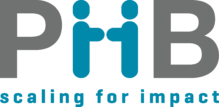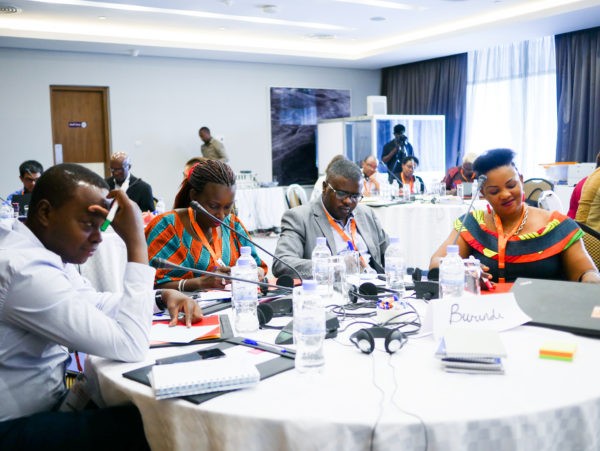
PHB Academy: Translating lessons into action
What did we learn? How did we learn? What do we do now? These were the central questions of the final learning event that PHB Academy facilitated for CARE POWER Africa.
Final Learning Event for CARE POWER Africa
24-26 April 2018, Kigali, Rwanda
What did we learn? How did we learn? What do we do now? These were the central questions of the final learning event that PHB Academy facilitated for CARE POWER Africa, a 5-year project to promote Village Savings and Loans Associations (VSLAs). PHB Academy’s Pete Sparreboom (below in the photo, standing) designed the event in close collaboration with the project’s regional team and used her expertise in process facilitation to help project staff find answers.
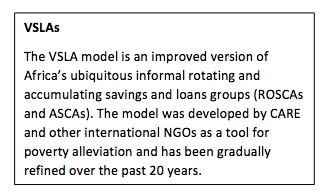
Financial services for the poorest
POWER Africa, implemented by CARE International between 2014 and 2018 with the support of the Mastercard Foundation, helped 750,000 food-insecure households in Burundi, Ethiopia, Cote d’Ivoire and Rwanda increase their financial literacy, develop income-generating activities, get access to formal financial services, and reduce gender gaps through VSLAs (see left for more details).
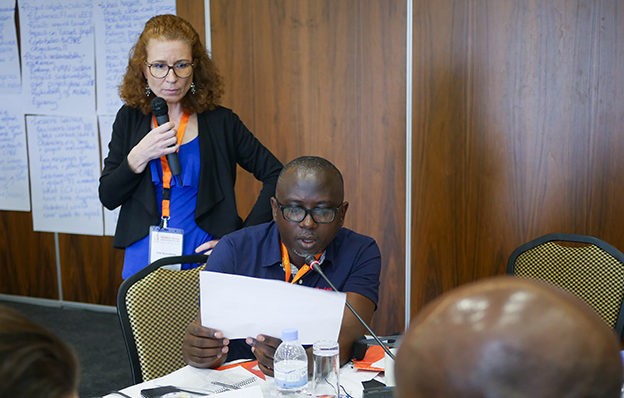
Ms Silvia Grande, CARE Canada’s Senior Advisor Monitoring, Evaluation and Learning said, “The workshop was aimed first of all at better understanding what POWER Africa had accomplished, and what lessons had been learned in the process.”
Lessons learned
The point of this end-of-project workshop was not to train project staff on the basis of VSLAs – after all, they were the experts! Instead, the purpose was to help them draw more advanced lessons from their experience, document these lessons, and use them in the design of new projects as well as personal action plans.
Some of the project activities and lessons learned that were discussed during the event:
- Efficient models for bringing VSLAs to scale: Instead of engaging with local NGOs, it may be better to engage individual members as Village Agents and support the development of an independent Village Agent Network (Rwanda and Burundi).
- Linking VSLA members to formal financial service providers: While banks and mobile network operators may initially hesitate to develop appropriate products for VSLAs, once they see the business case they will invest (Rwanda and Cote d’Ivoire).
- Decreasing gender gaps through VSLAs: Groups of girls-only adolescents can result in jealousy, and in violence by boys; engaging “male role models” in awareness-raising can help overcome that problem (Burundi and Cote d’Ivoire).
- VSLAs as a source of resilience: Access to savings, credit and advice from peers through VSLAs can help members cope with climate change and drought without selling livestock (Ethiopia), and with political instability (Burundi).
Investment in knowledge generation
One of the reasons why the project achieved much more than it initially set out to do is that the Mastercard Foundation made available a budget for monitoring, evaluation and learning that was much larger than usual in projects of this nature. It also encouraged staff to submit evidence-based proposals for changes to activities and budgets and approved many. Ms Silvia Grande said, “PHB helped us see how we had applied action learning in the different countries, and how we could apply action learning even better in the future.”
The value of facilitated peer learning
Ms Grande continued, “We were happy to have an external facilitator like Pete to structure our experience and help us realise how we could carry forward our learning. Besides, her technical knowledge of financial inclusion and VSLAs was very useful, with good examples to share from experience.”
Pete Sparreboom, in turn, was pleased to be able to assist CARE staff in strengthening their skills in participatory action learning and adaptive management, in translating lessons into concrete projects and action plans, and in embedding continuous learning and improvement even deeper into CARE’s practice.
For more information about the CARE POWER Africa project, visit: https://care.ca/power-africa
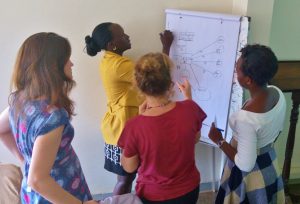
PHB Academy Embarks on new DFS Training Initiatives in Uganda
“Complex issues were made understandable, drawn from extensive Ugandan and global experience,” said Tamsin Scurfield of Opportunity International about participating in a recent PHB Academy training in Kampala, Uganda.
“Complex issues were made understandable, drawn from extensive Ugandan and global experience,” said Tamsin Scurfield of Opportunity International about participating in a recent PHB Academy training in Kampala, Uganda. A dozen people took part in the 5-day course – 27 Nov. to 1 Dec. – from organizations including FINCA Uganda, FINCA International, Opportunity International UK, Opportunity Bank Uganda and Uganda Management Institute.
The hands-on, interactive sessions covered understanding the Digital Financial Services (DFS) ecosystem, selecting a DFS business model, agent banking, mobile banking and partnerships, and funding DFS. “The week after training, we used the material to guide into a DFS strategy. A draft strategy has now been put together and the training provided a clear roadmap for this – so participation was very relevant,” added Tamsin about the courses.
These training sessions were held at the Uganda Management Institute (UMI). Courses facilitated active sharing of expertise from both instructors and participants and were intended to be the first in a series of such sessions. “Not only did the facilitators give sufficient and relevant examples, but they also allowed us to bring own examples,” said Don Twine, from FINCA Uganda, who participated in the training. PHB is further coordinating with the UMI to establish a partnership around training and consulting to support the ambitious Uganda strategy for financial inclusion, with the next training session scheduled for March 2018.
Mr Philippe Breul and Dr Henry Clarke Kisembo, of PHB Development/PHB Academy, led this course instruction in Kampala. “We’re also working with FINCA and Opportunity International on an ambitious financial inclusion initiative for the South Sudan refugees in Uganda, as part of the in-depth work done during the training, said Philippe.
Objectives in this training course included:
• Understanding ways to use technology to further the goals of a financial institution.
• Understanding DFS concepts and distinguishing different business models.
• Understanding the costs and risks of DFS for different stakeholders.
• Being able to strategize with senior colleagues about DFS priorities.
• Being able to assess potential partners and help negotiate mutually beneficial deals.
• Being able to sell DFS projects to regulators, boards, owners and funders.
And coming soon on the PHB Development website: The PHB Academy Training Catalogue with details about our specialized learning opportunities on Digital Financial Services!
